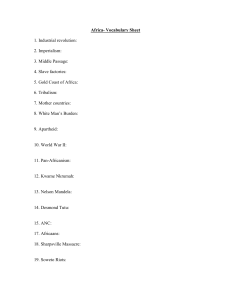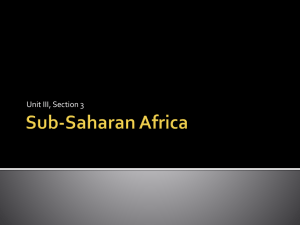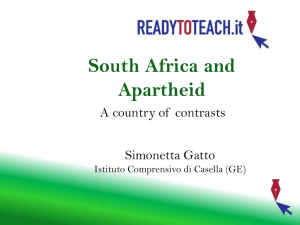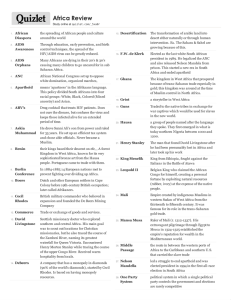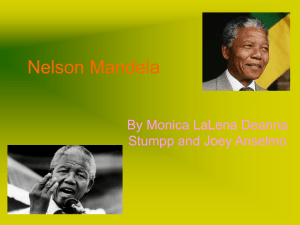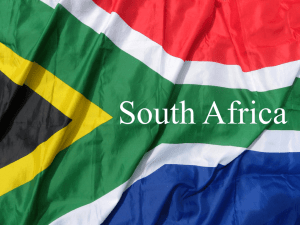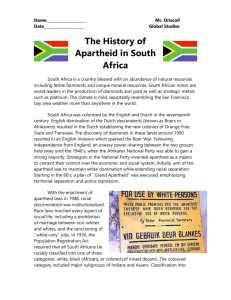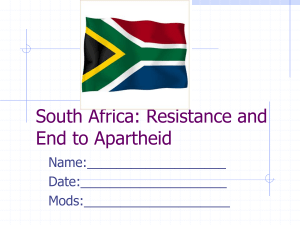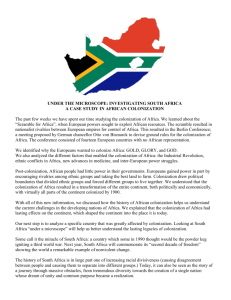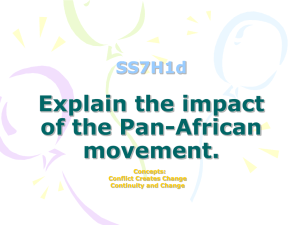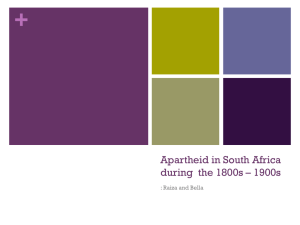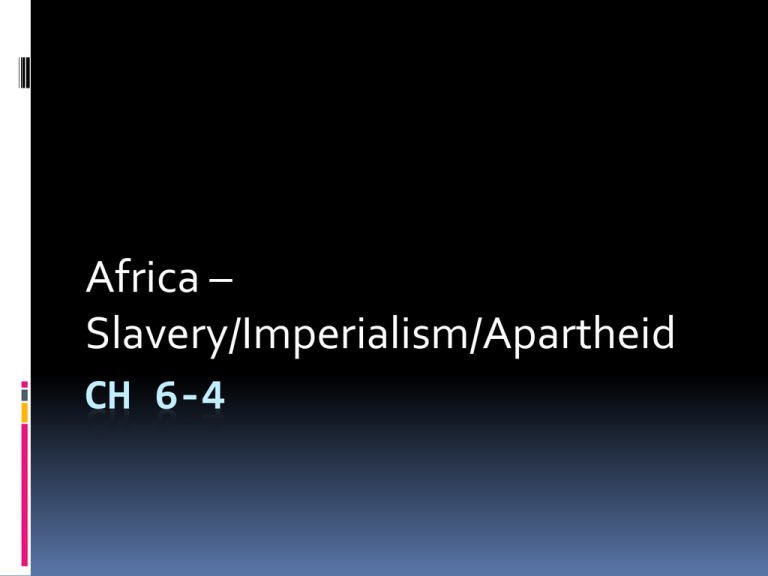
Africa –
Slavery/Imperialism/Apartheid
CH 6-4
African Slave trade…
Low estimates state 12 million Africans were shipped to the
Americas from 1500’s – 1800’s to work as slaves.
Leaders of some indigenous African states participated in the
trade earning $$ and firearms;
Millions of young African were forced to abandon the continent of
their birth; many died in transit or were worked to death; few
who survived returned thus depriving the continent of a
generation of the vital resource of young, energetic men &
women.
When slavery was abolished (first in Europe then in the US) it left
the east & west coasts of the continent with a great loss of people
(diaspora) – but also helped spread African ideas, customs &
beliefs around the world.
European Imperialism in
Africa…
European industrialization replaced their need for human
labor with a need for raw materials so once again Africa with
its rich resource base became a focus.
By the mid to late 1800’s economic, political & religious
motives led European nations to an all out scramble for
control of Africa.
At the Berlin Conference in 1884 13 European leaders gathered
to carve up sub-Saharan Africa into colonies – no African
leaders were present.
After this surveyors, soldiers, missionaries, officials & settlers
flocked from Europe to Africa to enforce their claims. There
were wars of resistance however in many cases European
weapons & military technology were superior.
Liberia & Ethiopia were the only 2 African states that retained
autonomy throughout the colonial period of the continent.
Control of Southern Africa…
3 groups engaged in a bitter power struggle
for this region: local African groups (like
the Zulu); Dutch settlers (called “Boers”);
and the British.
Local African groups battled to control the
desirable farmland of Southern Africa. Of
these groups the Zulu – under the
leadership of Shaka – created the largest
African kingdom due to their innovative &
fierce military skill.
Southern Africa continued…
Dutch settlers came to southern tip of the continent in
1652 & set up a colony at Cape Town. They enslaved the
local Africans they encountered & tried pushed north
where they discovered diamonds, gold & the Zulu.
With the help of British troops, the Boers were able to
defeat the Zulu & control the region …until…
The British decided they wanted it for themselves!
The British & Boers go to war with the British eventually
winning ; however…
8 yrs. Later the British grant self-government to the area
creating the “union of South Africa” & set up a
constitution that gave the right to vote to white men
only.
South Africa…
Because the Boers made up a majority of the
white population of South Africa they gained
control of the government.
This gov’t. introduced the policy of “separateness”
known as Apartheid & enacted laws that were
prejudicial to nonwhites.
Laws were passed to separate races in all aspects
of life (work/school/relationships/settlement
areas, etc.) Ultimately black homelands were
established – to be occupied by blacks on the
worst land. This formal system of discrimination &
racism led to total political & social control by the
white minority.
Life under Apartheid…
3 million blacks lived in these homelands &
were forced to carry “passes” which limited
their movement outside of the homelands as
well. Blacks were denied formal citizenship as
they were considered citizens of the
homelands & not of the nation.
Some non-whites were allowed to live in
“townships”, segregated neighborhoods on
the outskirts of cities, where their labor was
needed.
Opposition to Apartheid…
Opposition to Apartheid began in 1960’s &
was led by blacks, but “coloureds” & Asians
also were involved.
International pressure, including trade
restrictions & banning from international
athletic competitions also helped end
Apartheid;
“Pass Laws” were eliminated in the 1980’s;
End of Apartheid…
1989 S. A. President F.W. DeClerk lifted the
ban on the African National Congress (ANC)
& other groups that opposed Apartheid;
in 1990 Nelson Mandela – the ANC’s best
known leader, was freed after 27 years in
prison & the gov’t. begins to hold talks with
black leaders;
Early 1990’s a new constitution is written to
guarantee black South African’s rights;
S. Africa after Apartheid…
1994 – free elections are held & Nelson Mandela is elected as
the new President.
Homelands were finally eliminated from maps of South Africa;
Racial & residential segregation is officially made illegal, but
South Africa remained sharply divided along race lines;
1999 – a peaceful exchange of power sees Thabo Mbeki
replace Mandela as the new leader;
Jacob Zuma replaced Mbeki & started his 2nd term in 2009; he
was a member of the S. Af. Communist party & has faced
charges of rape, corruption & fraud – all of which have been
dropped.
Racial & economic problems persist in South Africa up to the
present. HIV/AIDS numbers are high as is the crime rate.
South Africa since
Apartheid…
http://abcnews.go.com/GMA/video/nelson-
mandelas-final-act-10886089
http://topics.nytimes.com/top/news/internati
onal/countriesandterritories/southafrica/inde
x.html
http://www.anc.org.za/
Significant leaders for African
Independence…
W.E.B. Dubois
Jomo Kenyatta
Julius Nyerere
Kwame Nkrumah
How was each man significant in the history
of Africa’s independence movements?
STAND & DELIVER…
Enduring Political Conflict…
Lack of readiness to participate in and run
democratic governments (“institutional
framework”);
Political & geographic structure of newly
independent states ignored indigenous
cultural and political differences & instead
placed groups together that had no desire to
be together.
TRIBALISM…
Defined: Loyalty to the ethnic group rather
than to the state.
Tribal identities take precedence over
national identities;
Most sub-Saharan nations have had a difficult
time forging a “national identity” that
appeals to all groups within the nation.
Virtually all African borders were “inherited”
through colonialism.
Refugees…
Definition: People who flee their state
because of a well-founded fear of persecution
based on race, ethnicity, religion, or politics.
Internally displaced refugees – people who
have fled from conflict but not left their
country.
Over 3 million in Africa had “refugee” status
in 2000.
http://www.unhcr.org/do1thing/index.php

